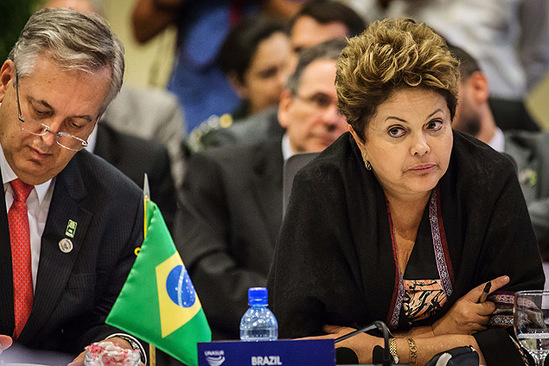The past weeks have been unusually turbulent for foreign policy makers and analysts in Brazil. Not only did Dilma substitute Brazil’s Foreign Minister Antonio Patriota, an intellectually brilliant diplomat who never quite gained the ear of the President, with the largely unknown Luiz Alberto Figueiredo (pictured above).
Itamaraty, Brazil’s much-admired Foreign Ministry, is also going through one of its most difficult moments, seemingly unable to end a string of scandals that threaten to keep it from developing a coherent foreign policy discourse. After overcoming the recent diplomatic crisis over Bolivia, Itamaraty again made headlines by appointing a former congressman twice convicted of embezzlement as new Ambassador to Angola, a major element in Brazil’s Africa strategy. Foreign policy thus continues to produce headaches for the President’s aides who are already eyeing next year’s elections.
These revelations could hardly come at a worse time, as Figueiredo is already facing a test that may become a first defining moment of his time as Foreign Minister. Reports that the United States have spied on President Rousseff’s private communication have created public pressure for Rousseff to cancel a planned formal state visit to Washington. Unless a face-saving solution can be found quickly (such as US support for Brazil’s campaign to obtain a permanent seat on the UN Security Council), US-Brazil relations could plunge into the deepest crisis in years, undoing years of former Foreign Minister Patriota’s work to improve ties after the end of the Lula administration. A presidential spokesperson said a trip by a Brazilian delegation to prepare for the president’s October 23 visit to Washington has already been canceled.
Being photographed next to Obama weeks after the spying revelations may make President Dilma look weak and submissive in the eyes of the Brazilian public. Yet canceling the state visit could delay important decisions in the context of US-Brazil relations, such as easing cumbersome visa restrictions. On the other hand, such a decision would probably gain Brazil wide admiration for being one of the few countries to stand up to U.S. spying activities, which have led to consternation around the world.
Contrary to what Rousseff may wish for, recent events underline that foreign policy is bound to remain high on the President’s agenda. Among many other issues, Brazil is set to host next year’s BRICS Summit, which will require key decisions regarding the grouping’s institutional future. The Syria crisis is unlikely to end anytime soon, requiring emerging powers’ input in the global debate about humanitarian intervention. And it is entirely unclear how Brazil and the United States will fix their strained bilateral relation after the spying scandal. Such issues may divert attention from important domestic challenges, but also provide a great opportunity for Brazilian foreign policy makers to leave past troubles behind and regain the initiative.
Read also:
The end of the emerging world?
Brazil’s enigmatic retreat: The case of the Responsibility while Protecting (RwP)
Can intra-BRICS cooperation advance amid economic gloom?
Photo credit: Jody Amiet/AFP









